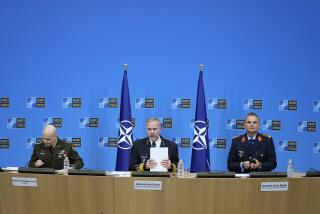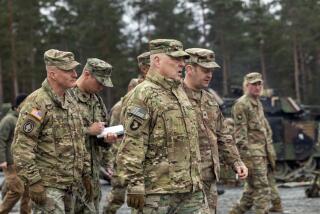Pentagon to Begin Training Journalists for Battlefield
WASHINGTON — In the latest signal that war with Iraq may be looming, the Pentagon said Wednesday that it will begin offering special training--including instruction on chemical weapons protection--to journalists who cover the military.
“While no decisions have been made about future operations,” Pentagon officials said in a memo to news organizations, “prudent planning demands that we prepare for embedding media with military units.”
The weeklong training courses are scheduled to start as early as mid-November, at bases in Virginia, New Jersey and Georgia and at an undisclosed location abroad. Pentagon officials said they expect hundreds of U.S. and foreign journalists to take part in the program, described as the first of its kind.
Officials said the training sessions are not mandatory, and were put together in response to recent inquiries from news organizations about media access in the event of a war with Iraq.
The memo, issued by Defense Department spokeswoman Victoria Clarke, said the Pentagon is “absolutely committed to ensuring reporters have maximum access to our troops on the battlefield.”
Access has long been a source of friction between the press and the Pentagon, particularly in the 1991 Persian Gulf War, when the United States expelled Iraq from Kuwait.
Correspondents covering that war complained that they faced unprecedented restrictions on where they could travel and what they were allowed to report.
Pentagon officials said many in the media were woefully uneducated about military matters and ill-equipped to cover or take part in “embedments,” in which reporters accompany military units on missions.
There was also significant tension between reporters and the military early in the war in Afghanistan. In one incident, a Washington Post reporter attempting to examine the site of an allied bombing said he was barred from the scene by U.S. soldiers brandishing weapons.
Iraq poses particular concerns for correspondents because of the threat of biological and chemical weapons. A recent CIA report warned of a “high” probability that Iraqi dictator Saddam Hussein would unleash such weapons if the U.S. invades.
As a result, the Pentagon said it would provide training and information about equipment to protect against chemical and biological weapons. The sessions will also offer basic survival and first-aid training, as well as instruction on major weapons systems and military procedures.
Clarke’s memo also warned would-be war correspondents to be in shape. “This training will be physically challenging and will include road marches and some fitness training,” it said.
More to Read
Sign up for Essential California
The most important California stories and recommendations in your inbox every morning.
You may occasionally receive promotional content from the Los Angeles Times.










